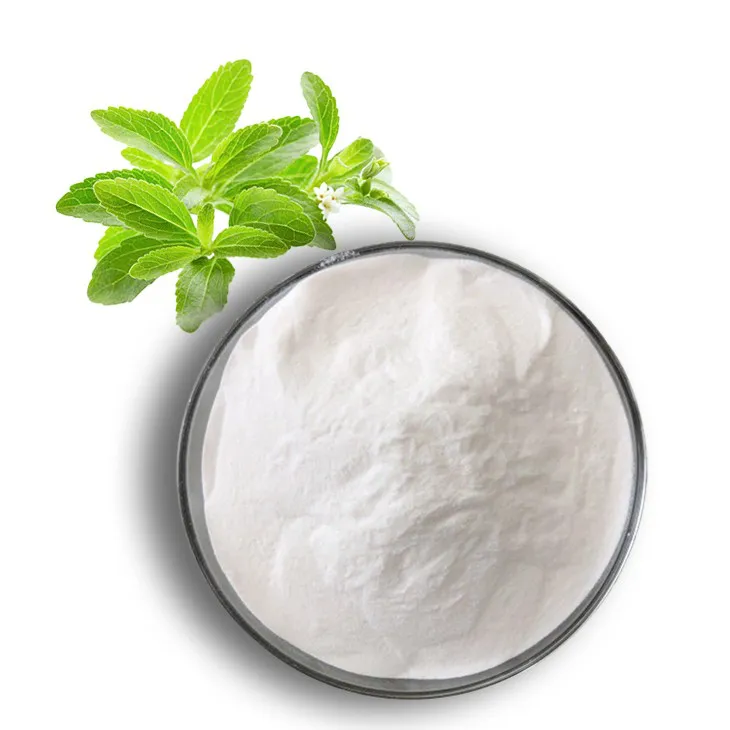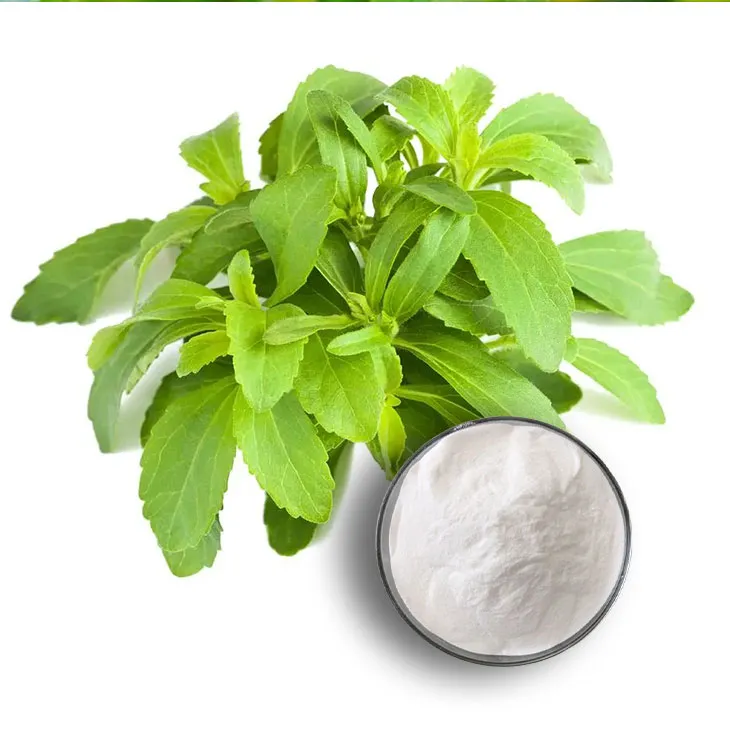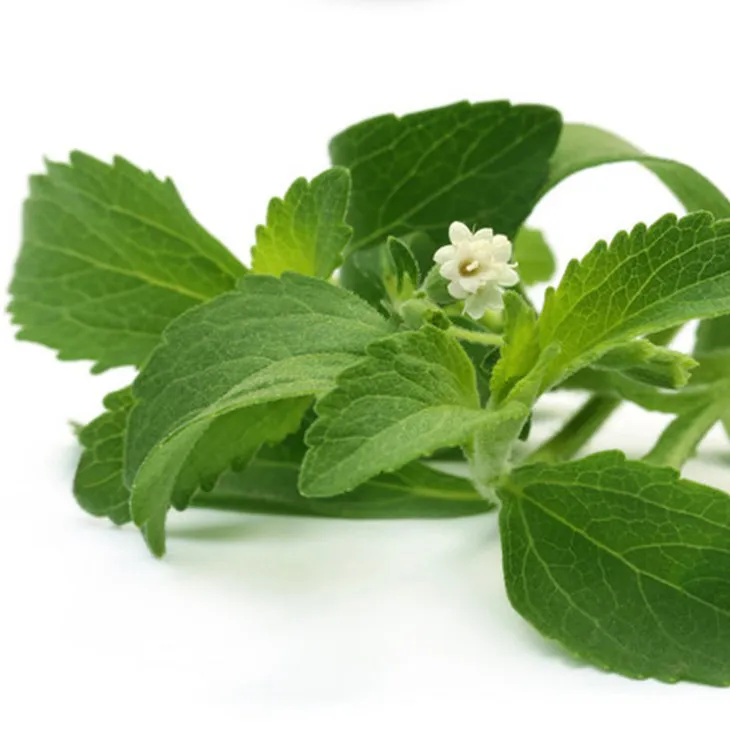- 0086-571-85302990
- sales@greenskybio.com
Have you heard of stevia extract? Five unexpected health benefits.
2024-11-13

Introduction to Stevia Extract
Stevia Extract, also known as sweetleaf extract, has emerged as a popular natural sweetener in recent years. Derived from the Stevia rebaudiana plant, it offers a sweet taste without the high calorie content associated with traditional sugars. This has led to its increasing use in various food and beverage products, as well as in home cooking for those looking to reduce their sugar intake. But beyond its role as a low - calorie sweetener, Stevia Extract has several unexpected health benefits that are worth exploring.

1. Blood Sugar Control
Stevia and Insulin Secretion
One of the most notable health benefits of stevia extract is its potential to help with blood sugar control. Stevia contains compounds that may stimulate insulin secretion. Insulin is a hormone that plays a crucial role in regulating blood glucose levels. When we consume carbohydrates, our body breaks them down into glucose, which then enters the bloodstream. Insulin is responsible for facilitating the uptake of glucose by cells, thereby reducing the amount of glucose in the blood.
Studies have shown that certain components in stevia, such as steviol glycosides, can interact with the cells in the pancreas that produce insulin. This interaction may prompt these cells to release more insulin, especially in response to elevated blood sugar levels. For example, in some in - vitro and animal studies, stevia extract has been shown to enhance insulin secretion in a dose - dependent manner.
Improving Glucose Tolerance
In addition to stimulating insulin secretion, stevia extract may also improve glucose tolerance. Glucose tolerance refers to the body's ability to process and metabolize glucose effectively. Impaired glucose tolerance is often a precursor to type 2 diabetes.
Research has suggested that stevia can influence the way the body handles glucose. It may enhance the action of insulin, allowing cells to more efficiently take up glucose from the bloodstream. This means that after consuming a meal containing carbohydrates, the blood sugar levels in individuals who consume stevia extract may rise more gradually and return to normal levels more quickly compared to those who do not. This can be particularly beneficial for people at risk of developing diabetes or those who already have diabetes and are looking for natural ways to manage their blood sugar levels.

2. Dental Health
Stevia vs. Traditional Sugars
Stevia extract is highly beneficial for dental health, in contrast to traditional sugars. When we consume sugary foods and drinks, the bacteria in our mouth feed on the sugar and produce acids. These acids can erode the enamel on our teeth, leading to tooth decay over time.
However, stevia does not provide the same food source for these harmful bacteria. Since it is not metabolized by oral bacteria in the same way as sucrose (table sugar), it does not promote the production of acids that can damage teeth. This makes it an excellent alternative for sweetening foods and drinks, especially for those who are concerned about maintaining good oral health.
Potential for Preventing Dental Problems
Not only does stevia not contribute to tooth decay, but it may also have some properties that could potentially help prevent other dental problems. Some research has suggested that stevia extract may have antimicrobial effects in the mouth. By inhibiting the growth of certain bacteria, it could reduce the risk of gum disease and other oral infections.
For example, in laboratory studies, stevia extract has been shown to have inhibitory effects on some common oral pathogens. While more research is needed to fully understand its role in preventing dental diseases in humans, these initial findings are promising and suggest that stevia could be a valuable addition to oral health regimens.

3. Anti - Inflammatory Properties
The Role of Inflammation in Chronic Diseases
Chronic inflammation is associated with a wide range of diseases, including heart disease, diabetes, and certain types of cancer. It occurs when the body's immune system is constantly activated in response to various factors such as stress, poor diet, and environmental toxins.
Stevia extract may have anti - inflammatory properties, which can be a significant advantage in reducing the risk of chronic diseases. Inflammation is a complex process that involves the release of various signaling molecules in the body. Stevia may interact with these molecules to modulate the inflammatory response.
How Stevia Extract Modulates Inflammation
Studies have shown that stevia contains compounds that can affect the activity of certain enzymes and proteins involved in the inflammatory pathway. For instance, some of the steviol glycosides in stevia may inhibit the production of pro - inflammatory cytokines. These cytokines are small proteins that play a key role in promoting inflammation.
By reducing the production of pro - inflammatory cytokines, stevia extract can potentially dampen the overall inflammatory response in the body. This may help to protect the body from the long - term damage associated with chronic inflammation and, in turn, reduce the risk of developing chronic diseases.

4. Weight Management
Stevia as a Low - Calorie Alternative
Weight management is a major concern for many people, and stevia extract can be a useful tool in this regard. As a low - calorie sweetener, stevia provides a sweet taste without adding significant amounts of calories to the diet.
Traditional sugars, such as sucrose and fructose, are high in calories. When consumed in excess, these calories can contribute to weight gain. By replacing these sugars with stevia, individuals can reduce their calorie intake while still enjoying sweet - tasting foods and drinks.
Impact on Appetite and Satiety
Another aspect of stevia's role in weight management is its potential impact on appetite and satiety. Some research has suggested that stevia may have an effect on the hormones that regulate hunger and fullness. For example, it may influence the release of ghrelin, which is known as the "hunger hormone," and leptin, which signals satiety.
If stevia can help regulate these hormones, it could potentially reduce appetite and increase feelings of fullness. This would mean that individuals may be less likely to overeat, which is an important factor in maintaining a healthy weight.
5. Antioxidant Effects
What are Antioxidants?
Antioxidants are substances that can protect the body's cells from damage caused by free radicals. Free radicals are unstable molecules that are produced during normal cellular metabolism as well as in response to environmental factors such as pollution, radiation, and cigarette smoke. If left unchecked, free radicals can cause oxidative stress, which is associated with a variety of health problems, including aging, cancer, and neurodegenerative diseases.
Stevia extract has been found to possess antioxidant effects. This means that it can scavenge free radicals and neutralize their harmful effects on cells.
How Stevia's Antioxidants Work
The antioxidant properties of stevia are attributed to the presence of various compounds, including flavonoids and phenolic acids. These compounds have the ability to donate electrons to free radicals, thereby stabilizing them and preventing them from causing damage to cells.
For example, some of the flavonoids in stevia extract have been shown to be effective in protecting cells from oxidative damage in laboratory studies. By reducing oxidative stress, stevia may contribute to overall health and well - being and may also play a role in preventing certain diseases associated with oxidative damage.
Conclusion
Stevia extract, or sweetleaf extract, is much more than just a natural sweetener. Its five unexpected health benefits, including blood sugar control, dental health promotion, anti - inflammatory properties, weight management support, and antioxidant effects, make it a potentially valuable addition to a healthy lifestyle. However, it's important to note that while stevia shows promise in these areas, more research is needed to fully understand its mechanisms of action and its long - term effects on human health. As with any dietary supplement or food ingredient, it should be consumed in moderation as part of a balanced diet.
FAQ:
What is stevia extract?
Stevia extract, also known as sweetleaf extract, is a natural sweetener. It is derived from the leaves of the stevia plant. It has become popular in recent years as an alternative to traditional sugars due to its various health benefits.
How does stevia extract help with blood sugar control?
Stevia contains certain compounds that can stimulate insulin secretion. Insulin is crucial for regulating blood sugar levels. Also, it may improve glucose tolerance, which means the body can better handle and process glucose, thus helping in blood sugar control.
Why is stevia extract good for dental health?
Traditional sugars are fermented by bacteria in the mouth, which produces acids that can lead to tooth decay. Stevia extract, on the other hand, does not promote this type of bacterial growth and acid production, so it is beneficial for dental health.
What makes stevia extract have anti - inflammatory properties?
The specific components within stevia extract are believed to possess anti - inflammatory properties. These components can interact with the body's immune and inflammatory response systems, potentially reducing inflammation. By reducing inflammation, it may lower the risk of developing chronic diseases associated with chronic inflammation.
How can stevia extract aid in weight management?
Stevia extract is a low - calorie alternative to sugar. When used in place of high - calorie sugars in foods and beverages, it can significantly reduce calorie intake. Since weight management often depends on maintaining a balance between calorie intake and expenditure, the use of stevia can be a helpful strategy in this regard.
Related literature
- The Health Benefits of Stevia: A Review of the Evidence"
- "Stevia Extract: Beyond a Sweetener - Implications for Health"
- "Stevia and Its Role in Promoting Health"
- ▶ Hesperidin
- ▶ citrus bioflavonoids
- ▶ plant extract
- ▶ lycopene
- ▶ Diosmin
- ▶ Grape seed extract
- ▶ Sea buckthorn Juice Powder
- ▶ Beetroot powder
- ▶ Hops Extract
- ▶ Artichoke Extract
- ▶ Reishi mushroom extract
- ▶ Astaxanthin
- ▶ Green Tea Extract
- ▶ Curcumin Extract
- ▶ Horse Chestnut Extract
- ▶ Other Problems
- ▶ Boswellia Serrata Extract
- ▶ Resveratrol Extract
- ▶ Marigold Extract
- ▶ Grape Leaf Extract
- ▶ blog3
- ▶ blog4
- ▶ blog5
-
Organic Tongkat Ali extract powder factory.
2024-11-13
-
How to make powder with ashwagandha extract.
2024-11-13
-
Rosehip extract manufacturers from China.
2024-11-13
-
The best cat's claw extract in nature.
2024-11-13
-
Chinese Dandelion Leaf Extract Suppliers.
2024-11-13
-
Nettle leaf extract
2024-11-13
-
Europen Bilberry Extract
2024-11-13
-
Artichoke Leaf Extract
2024-11-13
-
Rosemary extract
2024-11-13
-
Epimedium extract powder
2024-11-13
-
Tormentil Extract
2024-11-13
-
Maca Extract
2024-11-13
-
Cranberry Extract
2024-11-13
-
Passionflower Extract
2024-11-13
-
Ivy Extract
2024-11-13





















